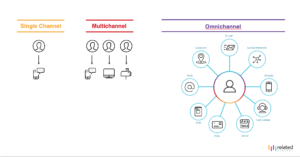What Are The Differences Between Multichannel and Omnichannel Marketing?

With new marketing technologies and emerging marketing strategies, there are many new terms that marketers should be aware of today. While understanding and applying these terms one by one requires hard work, some terms are often confused one for another. Multichannel and omnichannel marketing comes to mind first when considering such ambiguous terms. Omnichannel and multichannel are two distinct marketing strategies, even if both focus on customers and prospects using multiple channels.
Omnichannel VS Multichannel
Multichannel marketing is the ability to interact with potential customers on various platforms. The channel used, may be print advertising, a physical store, website, promotional event or product package. Omnichannel marketing is an approach to providing customers with an integrated customer experience through multiple sales channels. The customer can exchange online, mobile, desktop and shop visits and the experience will still be flawless. Let us be clear by explaining the differences between multichannel and omnichannel marketing clause-by-clause.
What is Omnichannel Marketing and Why Your Business Needs It
Utilizing of Channels is Different
The multichannel marketing approach aims to deliver messages through maximum number of channels possible. Multichannel casts the widest network that marketing ever can to enable more customer interaction. Companies use multichannel strategies to achieve customer interaction utilizing two or more channels, and the most popular channels in multichannel marketing are social media and email. On the contrary, the omnichannel marketing approach is achieved by establishing a holistic interaction, making each channel relevant for one another. The goal is to ensure that the customer has a great overall experience with the brand on each of the channels. The focus is on building strong and sustainable relationships between the customer and the brand. According to a study published at the Omnichannel Institute, companies that offer well-defined omnichannel marketing customer experiences can retain more of their customers, with 91% increase each year compared to companies that fail.
Consistency of Message
Omnichannel’s focus on customer experience reveals the second major difference between strategies: Consistency. In Omnichannel marketing, you aim to ensure that the customer receives the same experience and a main message from each channel. A consistent brand image and message are the things that improve familiarity and sustainable brand relationship. Marketers should ensure that all departments are aligned in interaction when implementing omnichannel marketing strategies. For example, public relations, social media and sales teams should strive to ensure consistency of the message as it is the most vital point in omnichannel marketing. In the Multichannel approach, interaction or consistency between channels is not the main objective since the basic principle is to convey the message.
Experience Approach
Another priority of omnichannel marketing is to understand or reduce the effort in customer experience. The tendency to connect more customers to more channels using more options is widespread. But this is more a multichannel approach. Omnichannel wants to provide an effortless environment for marketing customers using the data at hand.
Measurement and Optimization
Most brands employ multichannel marketing efforts and strive to make their channels more effective and measurable. The central matter here; there are different approaches for each channel. Omnichannel marketing is holistic and aims to create personalized and consistent customer experiences by measuring and optimizing all aspects.
In summary, omnichannel and multichannel marketing are two different and unique strategies aimed at reaching existing and potential customers through multiple channels. It is unnecessary to propose that one is more valuable or more important than the other. Marketers should focus primarily on flawless customer experience efforts to keep their customers and increase their revenue.


